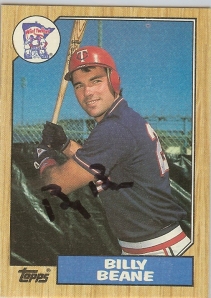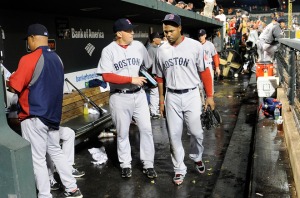
Billy Beane is a man who ate his own ego for lunch so he could feed a diaspora of major league misfits. In the newly released film
Moneyball, the ultimate cressendo to this narrative sounds as farfetched as the chances for the release of Moneyball II. What could be a more tragic and poetic irony? His team loses in 2003 to the one assembled by
Theo Epstein. Epstein descends from the same mountain of math parading the same
Jamesian tablets of runs, hits, chapters, and verses. This tragedy is made all the more ironic by the scene that wasn't cut: Beane turns down the chance to play after 2002 with
sabermetrician kingpin Bill James and a payroll in an upmarket sports-crazed fishbowl called Boston.
I practice sublimation on a professional level. That means trying not too waiver to far from the middle between expressive and controlled behavior: READ: Bob Dole referring to self as "Dole." It's important to objectify one's self through the eyes of others -- not as a bystander but an active observer, a.k.a. writer. Nothing personal = everything impersonal. That skill takes on added importance after two and a half divorces, two religions, twenty residences, five careers (no crap jos need apply) and the assurance there's no one else's flat-footed shoes I'd rather walk in. It makes complete sense that the one group I would have as a member consists of insurgent iconoclasts. No one joins groups that would have them as members. We are a band of brothers. They are family to me. One of them, Bal (a bona-fide Jamesian disciple), accompanied me to Moneyball over the weekend.
Bal believes that Beane's early fall from baseball grace led Beane to draw lessons on both a personal and communal level:
1. Laboring in obscurity can spell the difference between personal redemption and public humiliation (Beane fanned out in New York first)
2. Baseball scouts (a flock to which Billy once belonged) are speculators with no skin in the game that platforms their recommendations
We see that Beane's idea of accountability is not based on raw potential but actual performance. We see him put up his own limited savings to consummate a deal and turn down an unnegotiated offer from the Red Sox that could have floated one-third of his A's payroll. Not surprisingly, Beane has since parlayed his high stakes dealing into part-owner status in the A's -- talk about job security!
There's another non-clinical term for "sublimation" called team work. There's a scene where Beane confronts
David Justice in a terra forma batting cage about the impending arc of his stardom. Justice is "more equal" than the other players because he consumes close to 20% of Beane's 2002 payroll but his earning potential is powering down. It's a classic lesson in free agency economics: "I don't need the money. I need the recognition that I'm worth the money."
Beane gives Justice a motivational sneak peak at the non-financial allure of retirement. That's the humility of raising one's leadership game just as a player starts to lose a step or two on the field. Mercifully there were no pep rallies or Gipper locker room speeches. The closest thing to a nosedive and comebacker narrative played out in the trivial media gossip about the blame and credit-taking. Beane was the fall guy and then Houdini when Art Howe was portrayed in the local press as the string-puller.
My favorite reconciliation in the movie is not between players, or lovers, or family members, or scouting reports but an abstraction. It's a notion that Beane's consuming obsessions dispense with deliberate clarity and speed: "I like to win. I hate to lose." The polarity, it seems, is not equal.
Everything is in perspective -- nothing personal.




